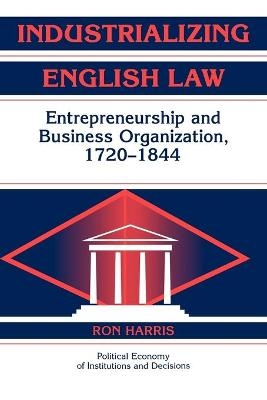
Industrializing English Law
Entrepreneurship and Business Organization, 1720–1844
Seiten
2011
Cambridge University Press (Verlag)
978-0-521-18252-2 (ISBN)
Cambridge University Press (Verlag)
978-0-521-18252-2 (ISBN)
This 2000 book addresses the discrepancy between the developing economy of England between 1720–1844, and the stagnant legal framework of business organization during the same period. The book focuses on the ways by which the legal-economic nexus of the period gave rise to the modern institutions of organizing business.
Between the passage of the Bubble Act in 1720 and the sweeping reforms of the General Incorporation Act of 1844, the legal framework of business organization in England remained remarkably stagnant despite the profound economic and structural changes wrought by the Industrial Revolution. Originally published in 2000, this book analyzes why this discrepancy occurred, especially when other nations of that time, whose economies were far less developed, were evolving more permissive laws of business organization. Employing extensive primary source archival material, Ron Harris shows how the institutional development of major forms of business organization - the business corporation, the partnership, the trust, the unincorporated joint-stock company - evolved and how English law finally took account of these developments.
Between the passage of the Bubble Act in 1720 and the sweeping reforms of the General Incorporation Act of 1844, the legal framework of business organization in England remained remarkably stagnant despite the profound economic and structural changes wrought by the Industrial Revolution. Originally published in 2000, this book analyzes why this discrepancy occurred, especially when other nations of that time, whose economies were far less developed, were evolving more permissive laws of business organization. Employing extensive primary source archival material, Ron Harris shows how the institutional development of major forms of business organization - the business corporation, the partnership, the trust, the unincorporated joint-stock company - evolved and how English law finally took account of these developments.
Introduction; 1. The legal framework; Part I. Before 1720: 2. The pre-1720 business corporation; 3. The Bubble Act, its passage and its effects; Part II. 1721–1810: 4. Two distinct paths of organizational development: transport and insurance; 5. The joint-stock business corporation; 6. Trusts, partnerships, and the unincorporated company; 7. The progress of the joint-stock organization; Part III. 1800–44: 8. The attitudes of the business community; 9. The joint-stock company in court; 10. The joint-stock company in parliament.
| Reihe/Serie | Political Economy of Institutions and Decisions |
|---|---|
| Zusatzinfo | Worked examples or Exercises |
| Verlagsort | Cambridge |
| Sprache | englisch |
| Maße | 152 x 229 mm |
| Gewicht | 510 g |
| Themenwelt | Recht / Steuern ► EU / Internationales Recht |
| Wirtschaft ► Volkswirtschaftslehre ► Wirtschaftspolitik | |
| ISBN-10 | 0-521-18252-2 / 0521182522 |
| ISBN-13 | 978-0-521-18252-2 / 9780521182522 |
| Zustand | Neuware |
| Haben Sie eine Frage zum Produkt? |
Mehr entdecken
aus dem Bereich
aus dem Bereich
ausgehandelt? – wie offen ist die Weltgesellschaft?
Buch | Softcover (2024)
UTB (Verlag)
22,00 €
Theorie und Anwendung
Buch | Hardcover (2024)
Vahlen, Franz (Verlag)
39,80 €
wie sich unsere Wirtschaftspolitik ändern muss, damit wir globale …
Buch | Hardcover (2024)
Wiley-VCH (Verlag)
39,99 €


